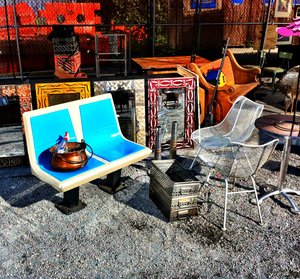I am very used to being noticed.
I am over six feet tall. I have piercing blue eyes. I have long hair (an oddity these days in New York.) I have a powerful speaking voice. I have a convincing smile. I am Caucasian. I am a male. Even the fact that I’m missing four fingers works to my favor.
I have everything going for me on the scale of noticeability. I am used to be noticed. So imagine my shock when I suddenly became invisible.
I was at a conference this week. It wasn’t your average conference. This was a conference of big shots. We’re talking about a private event where the heads of marketing at some of the biggest corporations rub elbows with each other, while agencies and vendors swirl about the fringes likes hawks that are both looking for fresh meat, while protecting their own nests.
It wasn’t a friendly place.
I was there because I am podcaster of some note. I moderate a weekly marketing discussion panel, called The BeanCast, that brings on folks just like this. I’ve had C-level folks on my show in the past, as well as some of the most noted thought leaders. So I belonged there.
And yet, I did not belong. I have never in my life experienced such blatant disregard, and it was always the same scenario. I would catch an eye and smile, then say, “Hi,” in that friendly, Southern-inspired manner I’d cultivated by too many years in Dixie. Then without a word, their eye would go to my name tag, then they would move silently away.
One time, I would have thought, “How rude!” Three times, I would have thought, “Did I forget my deodorant?” After a dozen times, I began to see the pattern. I was a podcaster. I wasn’t worth their time.
I could dwell on the business ramifications of this type of attitude. I could rail that people discussing social marketing should really cultivate a more open and conversational demeanor. But that’s not where all this led my mind. Instead I was confronted with the fact that for the first time in my tall, white, blond-haired, blue-eyed, male life, I had been discriminated against.
And I did not like it at all.
Ralph Ellison didn’t write The Invisible Man because it was a convenient story vehicle. He wrote the book and entitled it such because it perfectly summed up the plight of the black man in America. Violence, lynchings, discrimination — all of it was horrible. But more deadly than any of that was the taking away of one’s personhood. Being attacked killed the body. Being ignored killed the soul.
Minority groups of all kinds know this feeling. Eyes turned away, benefits denied, rights ignored — a feeling of being unacceptable in the eyes of your peers. It is dehumanizing and it sucks and it needs to stop.
Now don’t think I am bemoaning my own fate. I left that room and I went on being a tall, striking, white guy. I went right back to being noticed, and I would never think to claim any real ownership on the discrimination front. But I will never forget the day that I was invisible — and how it truly opened my eyes to what many of you feel on a daily basis.

Robert Knorpp is host of The BeanCast Marketing Podcast at thebeancast.com and is President of The Cool Beans Group, a marketing strategy consultancy based in New York City. He likes laughing even more than breathing. You can follow the madness on Twitter at twitter.com/BobKnorpp.









